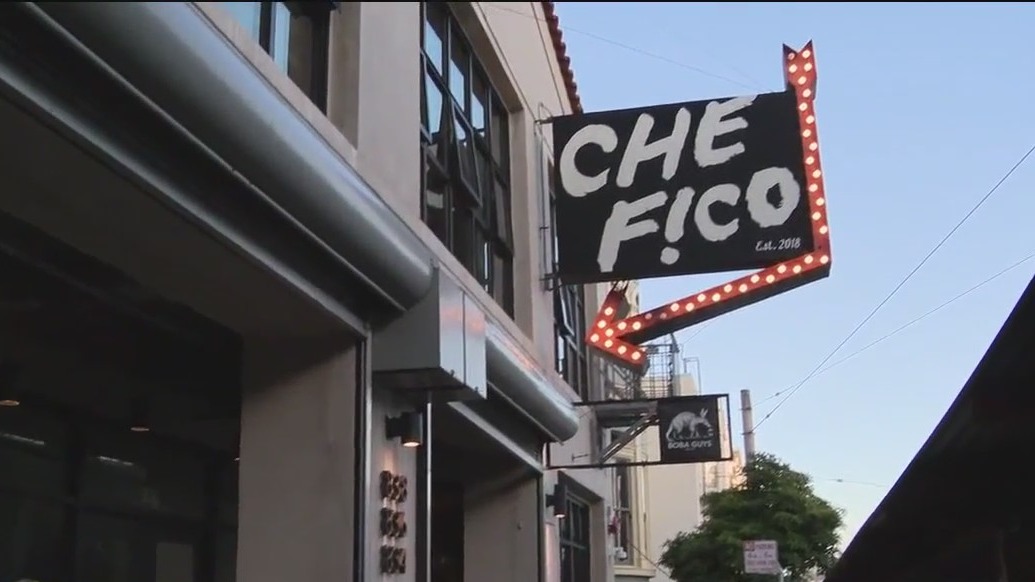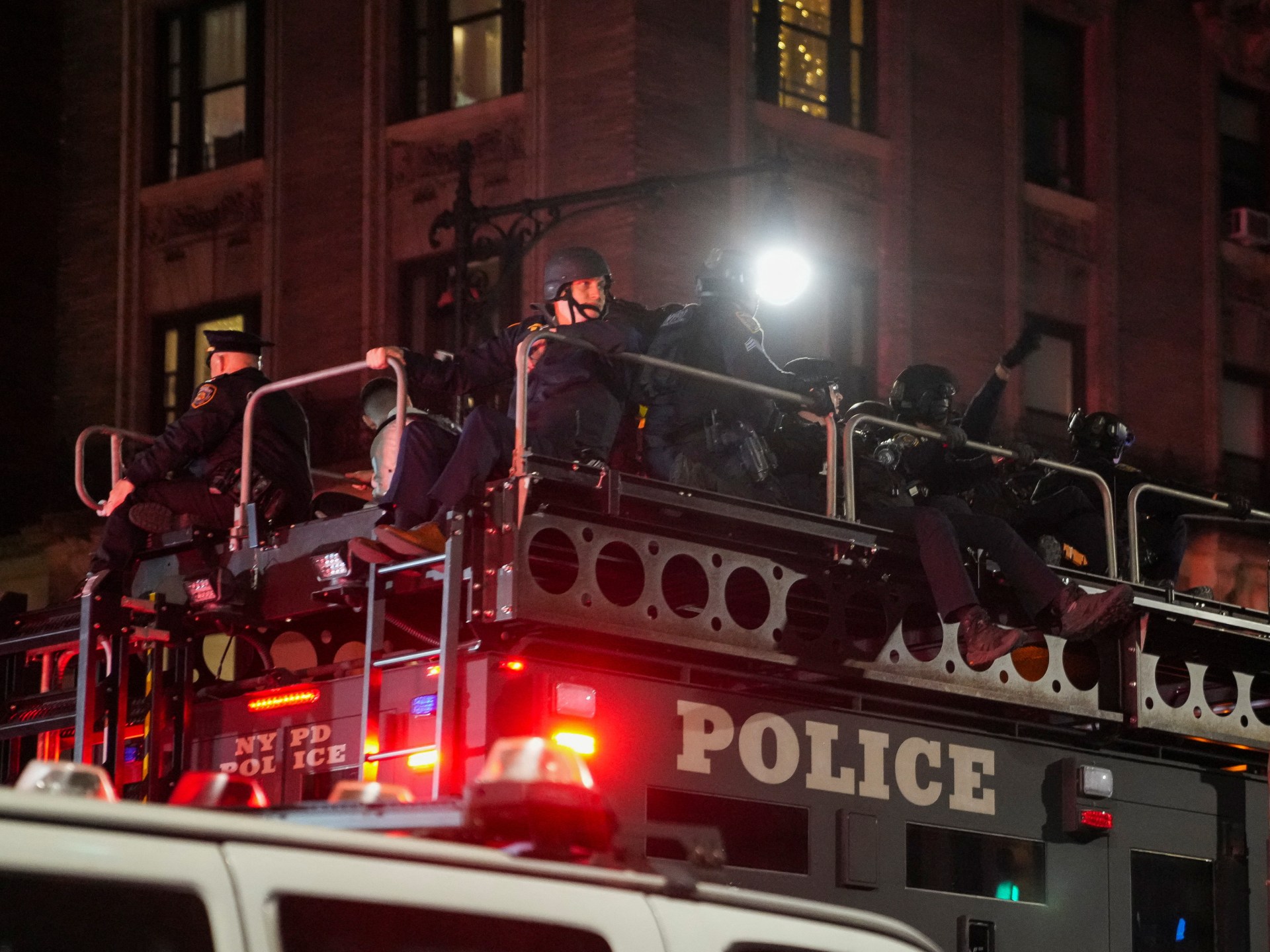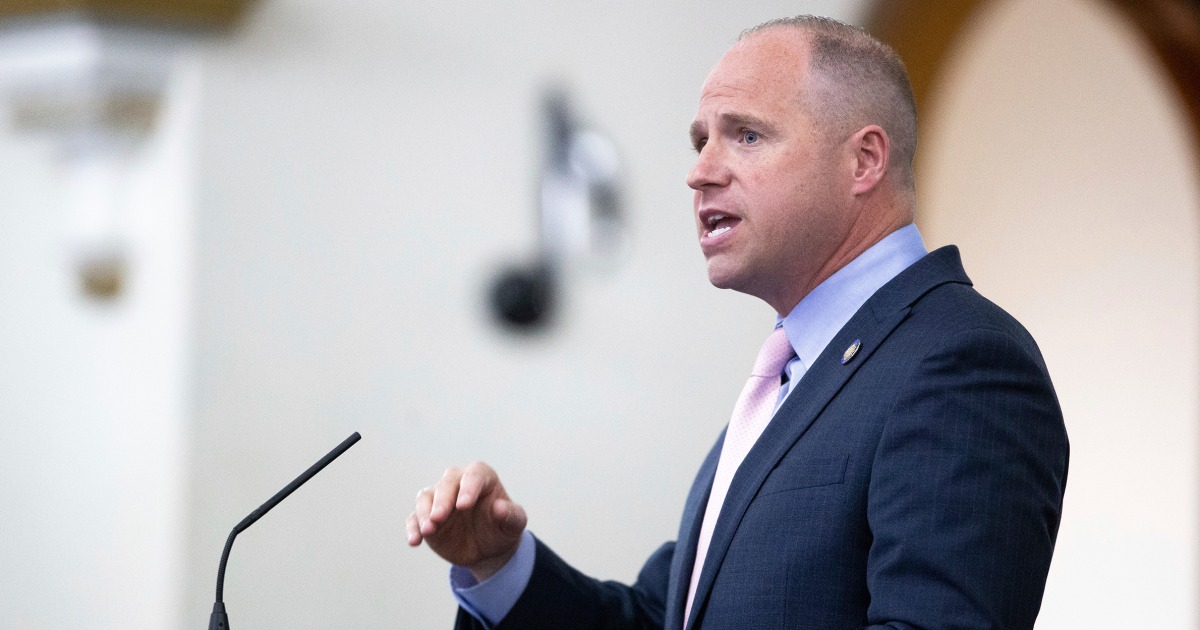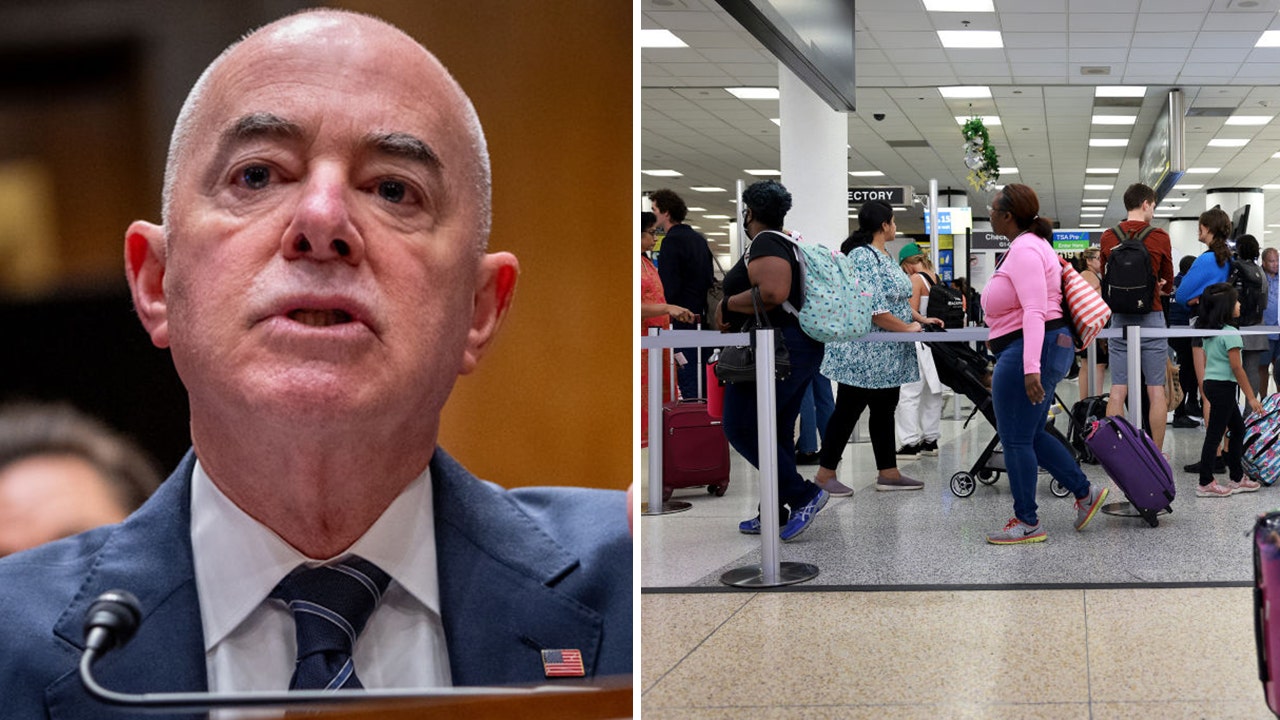Business
One of L.A.’s last family-owned cinemas is in limbo. Its fans aren’t ready to give up
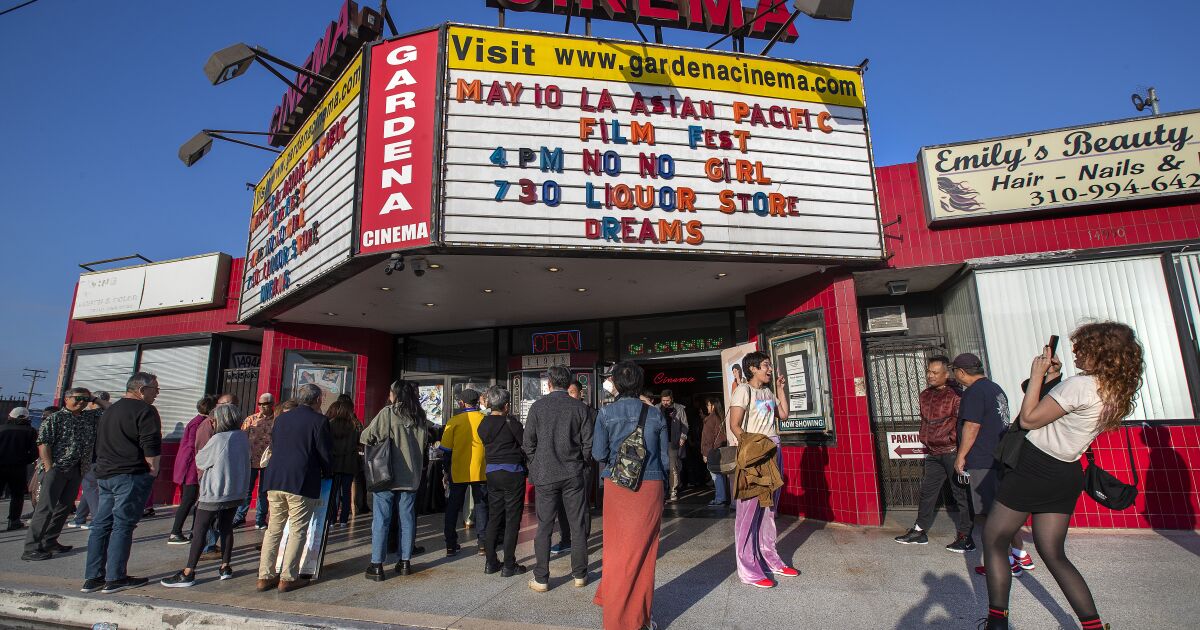
Most Wednesday nights, the 800-seat Gardena Cinema has only a handful of people sitting in front of its single screen.
But last week, hundreds of moviegoers almost filled the historic theater twice in one evening, for back-to-back shows as part of the Los Angeles Asian Pacific Film Festival. And that came days after another film organization hosted a special event, drawing about 500 guests to the cavernous space behind an unassuming front on Crenshaw Boulevard.
“I haven’t seen that many people at the theater in probably a few decades,” said Judy Kim, who runs the cinema, one of the last family-owned and operated single-screen theaters in Los Angeles. “I’ve been going nonstop with these special events.”
The revival of the neighborhood cinema, built in 1946 and purchased by Kim’s parents almost 50 years ago, was ignited a few months ago, when Kim realized she couldn’t keep the cinema afloat on her own.
Judy Kim, right, owner of the Gardena Cinema, hands popcorn to Kay Shishima of Montebello during a recent film festival as volunteer Kelly Charlshe looks on.
(Mel Melcon / Los Angeles Times)
It had been a difficult few years for the family: Her mother — the cinema’s heart since the Kims took over in 1976 — had recently lost her battle with cancer, and the theater remained shuttered for almost three years due to the pandemic.
“The money started running out,” said Kim, 51. “I told my dad, ‘I’m going to need volunteers because I can’t do this by myself.’”
Almost immediately, the community responded to her call.
A groundswell of energy and support breathed new life into the theater as volunteers pitched in to sell tickets, fill concessions, improve the theater’s social media presence and spread the word about the longtime family business.
“The place is rad; there’s no place like this,” said Matt Collette, 48, who joined Kim’s Friends of Gardena Cinema volunteer group, which has continued to expand since October. “You walk in and it looks like time just stopped around 1987. … There’s no more of these places.”
Francis Cullado, executive director for Visual Communications, said the team behind the Asian Pacific Film Festival was excited to join in the renewed support for the theater.
“We’re just glad there’s a space like this for us to come into,” Cullado said. “For us, we really want to make sure it’s sustained. … There’s just a character here that you can’t replicate anywhere else.”
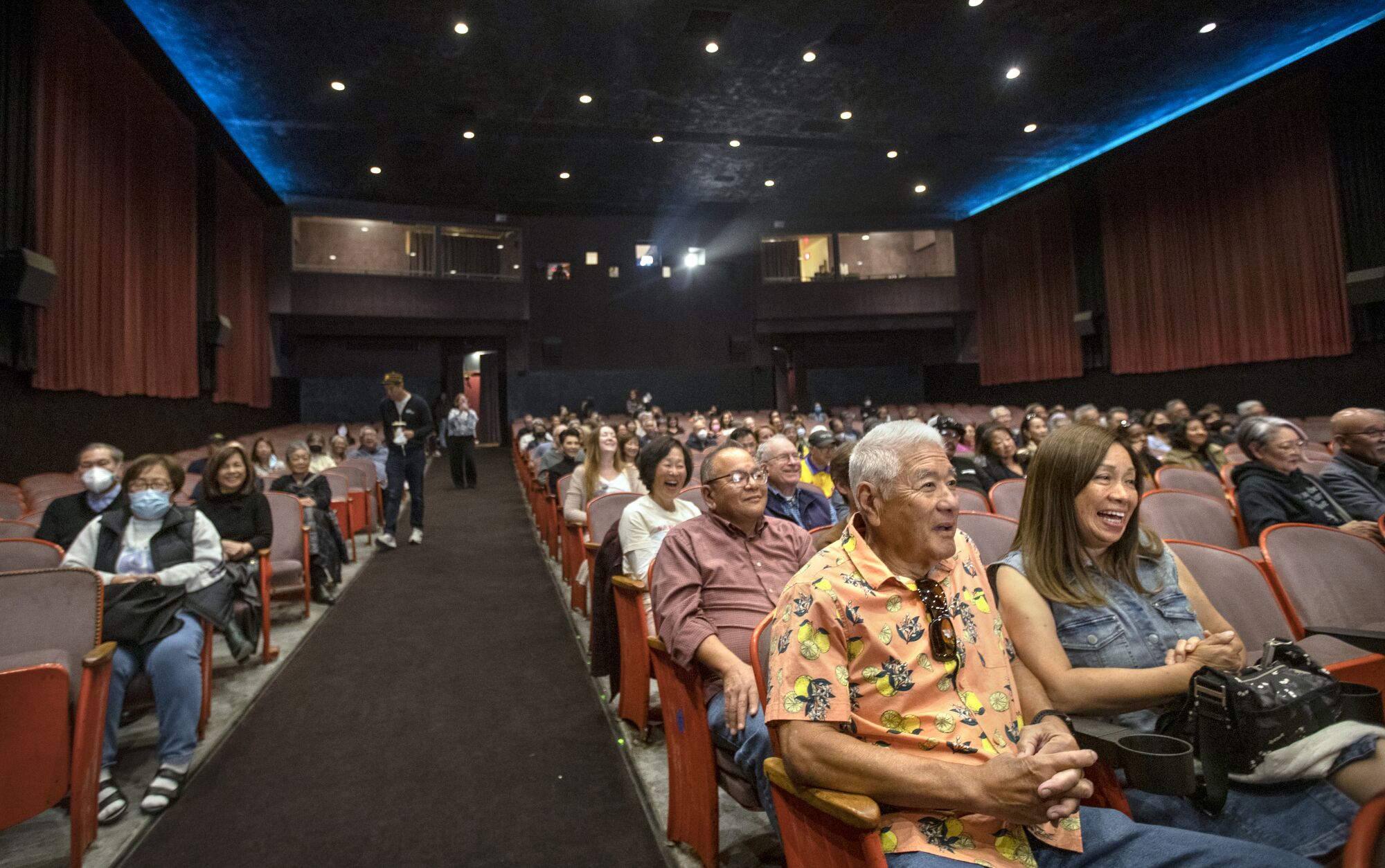
The 800-seat Gardena Cinema retains its old-school charm with red-velvet draping, no-frills seating and old movie posters in the lobby.
(Mel Melcon / Los Angeles Times)
With its red-velvet draping, carpet flooring and no-frills seating, little has changed at the theater since Kim’s parents purchased it a few years after they emigrated from South Korea, besides an upgrade to a digital projector (though Kim still has the old film projector).
Mismatched letters on the theater’s outdoor marquee display the movie schedule for passersby. Inside, colored neon lights hang above the concessions counter, where kernels pop over the sides of a vintage popcorn pot and a yellow notepad collects visitors’ handwritten movie suggestions.
And while the space itself is a draw for any film lover or old-school enthusiast — it’s even been used as a movie set for some recent films and documentaries — most patrons and volunteers say it’s Kim’s warm smile and passion for her community that keeps them coming back.
“There isn’t anything she wouldn’t do for the community — and anyone who meets her, there isn’t anything you wouldn’t do for her,” said Tiffany Nitsche, president of the Los Angeles Historic Theater Foundation’s board of directors.
Nitsche said it’s hard to definitively say Gardena Cinema is L.A.’s last family-owned single-screen theater after Quentin Tarantino recently bought the Vista Theater in Los Feliz, but she said it is “the last family-owned and operated, first-run, single-screen movie theater” — meaning it shows new blockbuster films such as “Black Panther: Wakanda Forever,” which was how Kim reopened last fall after the long pandemic shutdown.
“Judy [Kim] does such a great job in making people feel so welcome,” said So Yun Um, director of “Liquor Store Dreams,” which showed last week at Gardena Cinema through the Asian Pacific Film Festival. “The hard part is people don’t know about it. … But now that people have seen the inside of it … it really creates a buzz and this sense of community.”
As hundreds flowed into the cinema last week, Kim scrambled around the theater she has managed for almost 30 years — where she grew up alongside her brother and other neighborhood kids — giving directions, restocking snacks, running upstairs to start the films, even pulling out a container of free sanitary pads when a young woman sheepishly asked for help.
The three women behind the counter taking orders for popcorn, soda, nachos and hot dogs were all volunteers, trying to keep up with the mad rush to ease Kim’s workload.
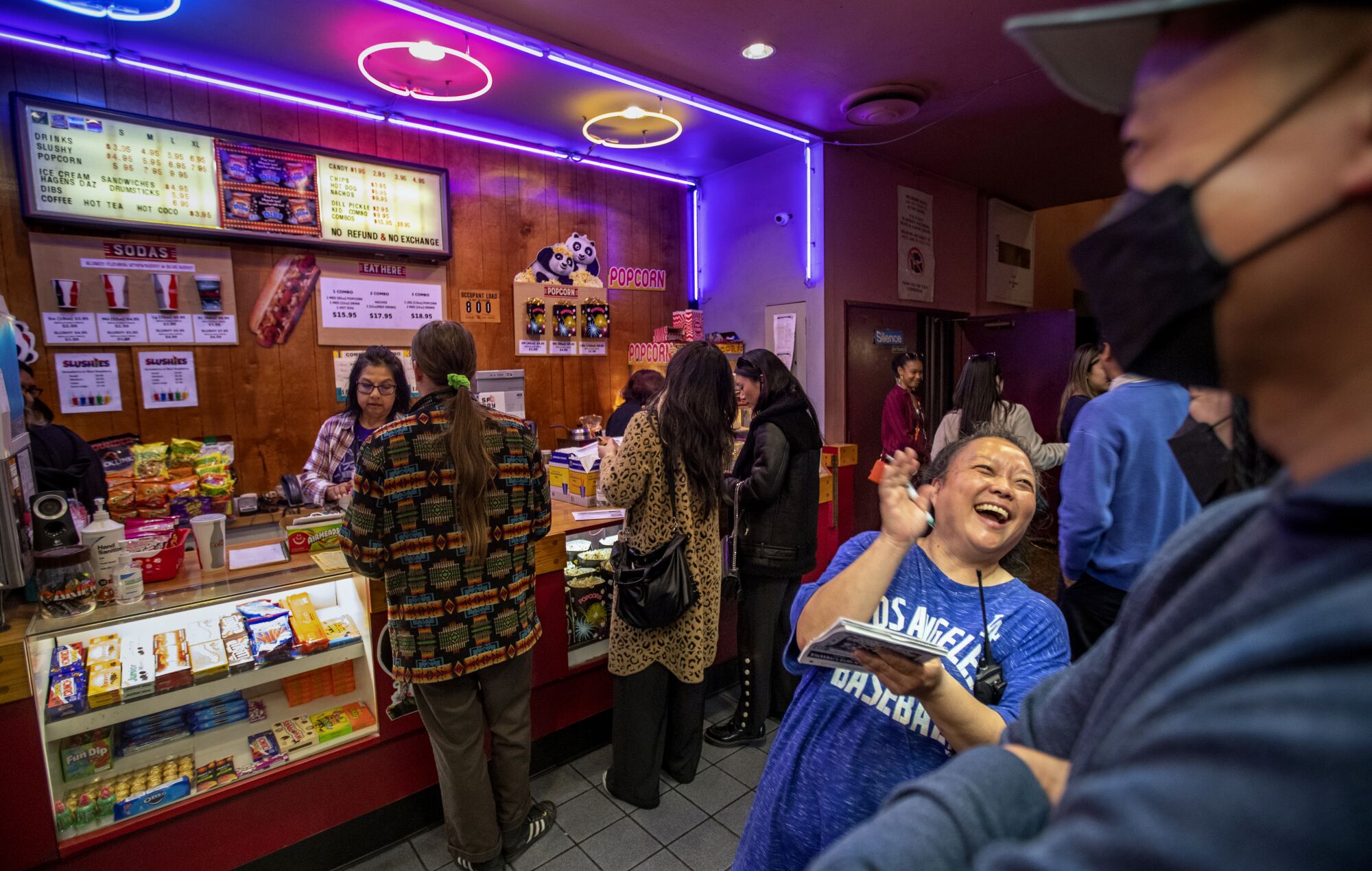
Judy Kim laughs as she takes a customer’s food order before an Asian Pacific Film Festival screening.
(Mel Melcon / Los Angeles Times)
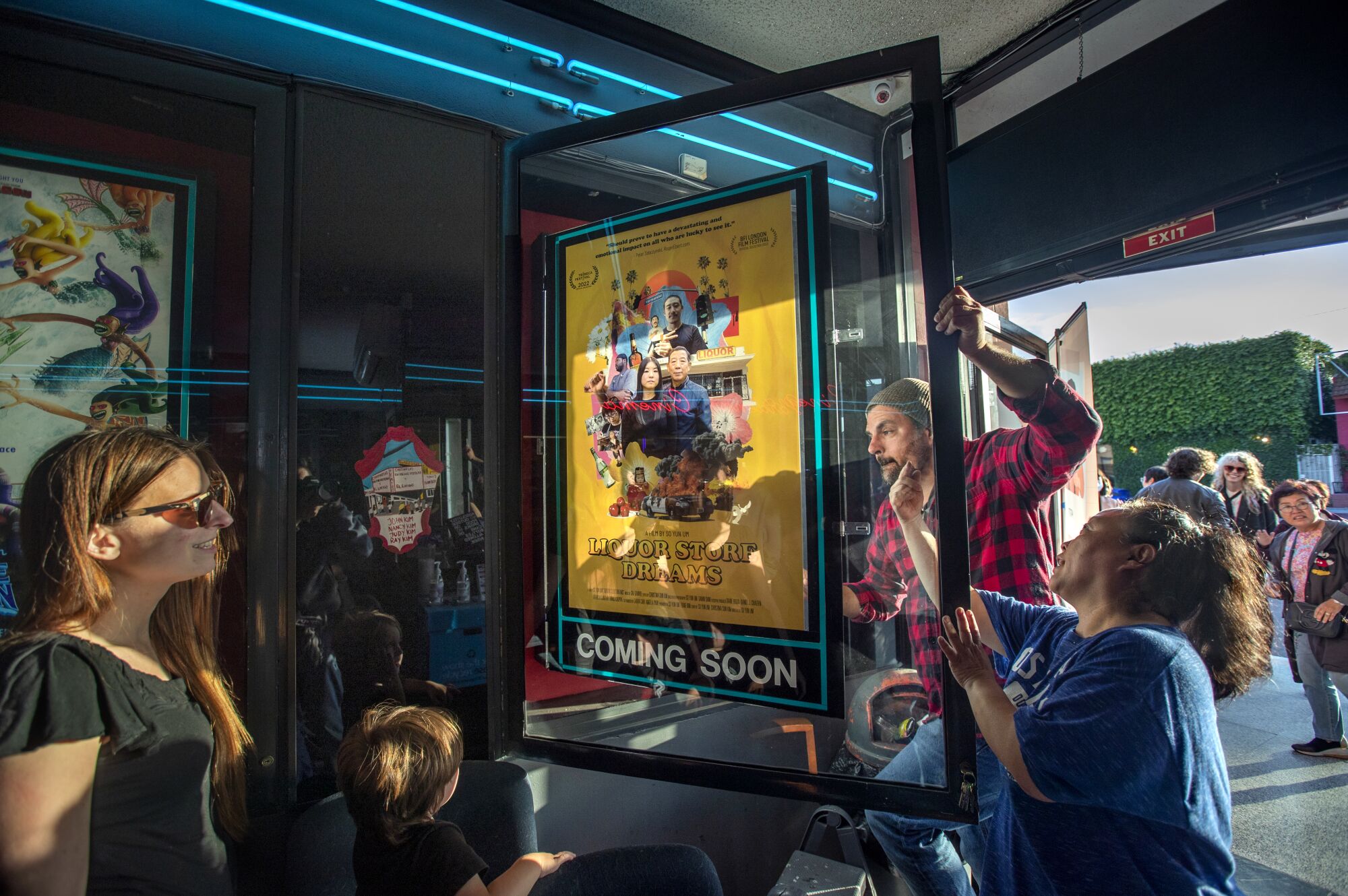
Volunteer Matt Wilczynski helps Judy Kim place a poster for “Liquor Store Dreams” inside a display case.
(Mel Melcon / Los Angeles Times)
When there was a question about pricing or the butter stopped pumping or a sink started flooding, the volunteer crew would shout for Kim. She literally came running.
“Let me get the mop,” she yelled, before taking over the cleanup duties. “It’s one of the reasons I can’t walk away. … If I leave, stuff like this happens.”
In the same breath, though, Kim smiled: “I really love all my volunteers.”
On a typical night, it’s just Kim running the theater — a “one-woman show,” she calls it. Her aging father will sometimes work the ticket booth if he’s feeling up to it, but usually it’s just her.
“She’s the booker, the manager … she has to clean the toilets, she’s security, the accountant,” Collette said. “It’s not a sustainable business model.”
Prima Devera, 53, worked the soda machine that Wednesday evening, a job she said she’s happy to take on to help keep the theater — and Kim — going.
“I was really happy to see the community come together, people trying to help save the cinema,” said Devera, who discovered Kim’s theater just before the pandemic and worried how the family would make it through. “I love that it’s family-owned, and being Asian, I loved that it was an Asian family-owned, independent theater.”
Gardena native Suzy Evans remembered visiting the theater as a teen, coming on first dates and with friends. Now, she has joined the growing volunteer network dedicated to the theater, most recently working the popcorn machine alongside Devera.
“It’s like deja vu,” said Evans, 70. “I don’t want to see it close.”
But the future of the cinema is unclear.
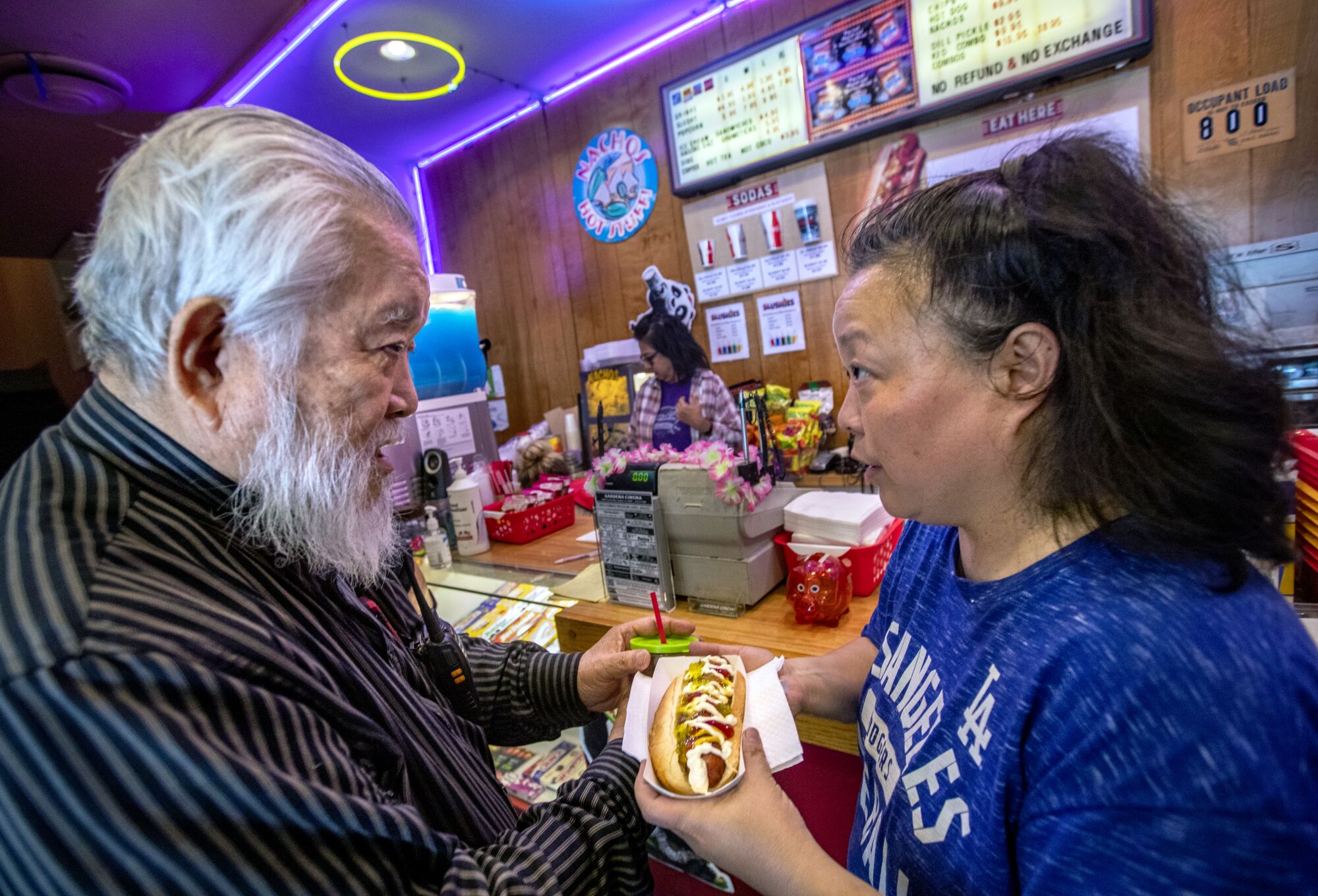
John Kim, 83, talks to his daughter Judy Kim. Judy took over management of the cinema in 1996 from her parents, who bought it in 1976.
(Mel Melcon / Los Angeles Times)
After much deliberation, Kim and her 82-year-old father listed the property for sale in January, but they are committed to waiting for the right price — something she promised her mom on her death bed — and keeping the show going in the meantime.
“There are no more future generations to leave the theater to in our family,” Kim said, explaining that neither she nor her brother has children. Her father wants to enjoy his last years with her, which she said is almost impossible while running the time- and energy-intensive business.
“I don’t really know what the future holds for me because I don’t have a buyer, and I might not have a buyer for like 10 years, right?” Kim said. “So, hey, why don’t I just continue operating it as a nonprofit organization for 10 years and give people the benefit of being able to donate to an organization that they want to keep, and keep the doors open?”
This spring, Kim registered with the state as a nonprofit and is working on finalizing her paperwork with the federal government — a step that she hopes will provide more financial support from donations or membership drives.
“The theater is so huge, and there’s so many things I need to do to maintain it,” Kim said. “The only way I’m going to get a new roof and a new parking lot and make the place pretty and freshen it up [is] if I get nonprofit status.”
But even that can be a difficult path for small, historic theaters. The nonprofit American Cinemateque recently bowed out after decades of owning and operating Hollywood’s Egyptian Theatre, selling to Netflix in 2020.
“If they happen to sell it, hopefully whoever purchases it will at least keep it a theater,” Devera said, echoing many of the Gardena Cinema volunteers. “I would really, really be sad to see this venue go completely.”
They hope that new interest in the theater, especially among young people, will help the cinema hold on to its legacy in the South Bay.
And with a resurgence in film, vinyl records and other old-school charms among Gen Z and millennials, Kim said it worked out that her parents were reluctant to pay for upgrades, like the new theater chairs she tried for years to get her mom to buy.
“It’s been so long now, it’s like cool,” Kim laughed. “Now that we kept them … they’re vintage.”

Business
Campaign to erect new city on Solano County ranchland submits signatures for November ballot

A billionaire-backed vision to erect an idealistic new city on scrubby grassland in rural Solano County is one step closer to becoming reality.
On Tuesday, the Bay Area tech leaders behind the campaign, dubbed California Forever, held a news conference to announce that they had turned over more than 20,000 voter signatures to the Solano County registrar in support of putting the issue before local voters. If the county validates at least 13,062 of those signatures, the measure would go before voters in November, seeking to amend zoning codes to allow the residential project to be built on agricultural land.
“Solano voters have made their first decision, and they have made it loud and clear,” said Jan Sramek, a former Goldman Sachs trader who is chief executive of California Forever. “People from all walks of life, all parts of the county are all saying the same thing. They are saying, ‘Yes, we want to have a say in the future of this place that we love.’ ”
John Gardner, the county’s assistant registrar of voters, confirmed his office had received the California Forever signatures Tuesday morning.
Gardner said the endeavor marks the first citizens-led ballot initiative in Solano County in more than 30 years. His office has until June 11 to conduct a preliminary review to determine whether enough valid signatures were submitted to put the measure to a vote.
Along with Sramek, backers of the project include LinkedIn co-founder Reid Hoffman, venture capitalist Marc Andreessen, and Patrick and John Collison, who founded the payment-processing company Stripe. As part of their campaign, California Forever in March released an aerial view of the group’s plans for a community of tens of thousands of homes, surrounded by open space and trails, using renewable energy sources.
Backers tout the project as an innovative way to create more affordable housing in close proximity to the Bay Area. The designs call for transforming 18,000 acres now dedicated to ranching and wind farms into a community of 50,000 residents that grows, over time, to as many as 400,000. The project promises 15,000 higher-paying jobs in manufacturing and technology, as well as parks, bike lanes and a solar farm.
Even if the measure is certified for the November ballot and voters approve it, the project faces a number of challenges and regulatory hurdles. Chief among those are additional approvals, including from the federal government, and the specter of lawsuits from environmental groups that have signaled they intend to take the nascent effort to court.
The project’s development began years ago with a series of mysterious land purchases by a secretive LLC called Flannery Associates. The group bought thousands of acres of farmland, totaling more than $800 million, over several years, raising concerns it was a front for foreign actors seeking to spy on nearby Travis Air Force Base.
Instead, the group’s members were revealed not as spies but as titans of the tech industry laying the groundwork for a model city that California Forever and its supporters say will help recast California’s image. While environmentalists and other critics have questioned that claim, the outfit pledges that the city will be green, walkable and socioeconomically diverse.
Business
Oatmilk dessert, hot honey seasoning, gluten-free items: Walmart launches branded food line

Walmart on Tuesday launched a line of store-branded groceries, stocking shelves with items like hot honey seasoning, a frozen dessert made of oat milk and several offerings for shoppers avoiding gluten or added sugar.
The line called Bettergoods marks the retail giant’s push to captivate more consumers, especially younger ones, and to win over more of a market dominated, in recent years, by companies such as Monrovia-based Trader Joe’s and Costco whose store-branded items — including chocolate-covered banana slices or chile and lime rolled tortilla chips or anything under the Kirkland Signature brand — have built cult followings of their own.
Private-label store brands have grown more popular in recent years as consumers have faced rising costs. Supermarket giant Kroger Co. previously announced it plans to add more than 800 private-label products this year.
Most of the new Walmart items, which will max out in cost at around $15, will sell for less than $5, according to a statement from the Bentonville, Ark.-based company on Tuesday.
Walmart executives said the new line marks the company’s largest private-brand food launch in 20 years.
Scott Morris, Walmart’s senior vice president of private brands, food and consumables, described the line as “quality, unique, chef-inspired food at an incredible value” — a nod to consumers’ desires for both trendy, flavorful foods and cutting costs amid stubbornly high inflation.
The new items fall into three categories — items geared toward food trends, a section of plant-based options branded with green packaging and a group of “Made Without” products for shoppers looking for items without gluten, added sugar or artificial flavors or colorings.
Among items customers can now find on shelves: a container of hot honey seasoning for around $3, oat milk dessert for $3.44 a pint and a line of soups served in jars for around $4.
The addition of 300 items will mean less coveted shelf space for other brands fighting for placement in stores.
The launch, which was reported first by the Wall Street Journal, comes as Walmart scales back investments in other areas, including shuttering several health clinics it opened in recent years.
A Walmart spokesperson declined to say how many people would lose their jobs but said the clinics likely would close in two to three months.
Bloomberg News contributed to this report.
Business
Former L.A. Mayor Antonio Villaraigosa joins cryptocurrency company Coinbase as adviser

Former Los Angeles Mayor Antonio Villaraigosa doesn’t own any cryptocurrency — at least, not yet. But he’s about to become a player in the industry’s push for friendlier cryptocurrency rules.
The trading platform Coinbase announced Tuesday that Villaraigosa, a Democrat who was mayor of Los Angeles from 2005 to 2013, is taking a paid position with its global advisory council.
In an interview with The Times, Villaraigosa said that he won’t be lobbying on behalf of Coinbase but that he is advising the company on securing a “robust, fair regulatory framework” for American customers.
Villaraigosa will focus on how to make financial systems more equitable for Black and Latino customers, Coinbase said. The company estimated that about 41% of American crypto investors are Black and Latino.
“Crypto users participate in our democracy like anyone else,” Villaraigosa said. “They need regulatory protection.”
Villaraigosa’s hiring is part of a broader publicity and lobbying effort by Coinbase after years of conflict between the industry and federal regulators, including the Securities and Exchange Commission.
Criminal investigations have recently taken down two of the best-known figures in the crypto industry: former FTX Chief Executive Sam Bankman-Fried, who was sentenced to 25 years in prison in March, and former Binance Chief Executive Changpeng “CZ” Zhao, who is scheduled to be sentenced Tuesday after pleading guilty last year to a money-laundering charge.
Coinbase and other firms have argued that the U.S. should be friendlier to the industry and that clearer rules are necessary to help American crypto companies compete with exchanges in countries with laxer regulations.
The industry has been spending heavily in the 2024 election cycle, signaling its willingness to boost candidates who support crypto priorities in Washington and oust those who don’t.
The policy advisory council that Villaraigosa is joining includes former Rep. Tim Ryan of Ohio, a Democrat, and former Pennsylvania Sen. Pat Toomey, a Republican, as well as political veterans such as John Anzalone, the pollster for Hillary Clinton’s campaign in 2016 and President Biden’s campaign in 2020.
Villaraigosa brings to the group a “feel for the body politic,” said Faryar Shirzad, Coinbase’s chief policy officer.
He “understands broader public attitude, public opinion, public sentiment, in a way that has been really helpful,” Shirzad added.
Villaraigosa said he would be helping with Coinbase’s efforts to push for a “level playing field,” including for stablecoin, a form of cryptocurrency that is ostensibly pegged one-to-one to the value of the U.S. dollar or an asset like gold.
Villaraigosa said crypto is a promising alternative for Black and Latino investors who have faced racial discrimination at traditional banks. He added that crypto platforms could also serve as an alternative for people who send money to family members in other countries, known as remittances.
People in the United States sent more than $81 billion abroad in 2022, according to the World Bank. The average fee for a $200 remittance payment across the world was 6.18% in the third quarter of last year, the organization said.
The cost to send money to family members through crypto platforms like Coinbase is “de minimis,” or minor, in comparison, Villaraigosa said.
Since leaving Los Angeles City Hall in 2013, Villaraigosa has taught at the USC Sol Price School of Public Policy and has worked as a partner at the consulting firm Actum. He mounted a campaign for governor in 2018, finishing third in the primary behind Gov. Gavin Newsom and Republican John Cox.
In 2022, Newsom tapped Villaraigosa to be a top adviser on infrastructure issues, tasked with helping to identify projects that could reap federal funding from Biden’s infrastructure law.
Villaraigosa has also worked as an adviser to Banc of California, the multi-level marketing company Herbalife and the AltaMed chain of health clinics.
-

 Education1 week ago
Education1 week agoVideo: Dozens of Yale Students Arrested as Campus Protests Spread
-

 World1 week ago
World1 week agoEU sanctions extremist Israeli settlers over violence in the West Bank
-

 Politics1 week ago
Politics1 week agoDemocrats hold major 2024 advantage as House Republicans face further chaos, division
-

 Politics1 week ago
Politics1 week agoFetterman hammers 'a–hole' anti-Israel protesters, slams own party for response to Iranian attack: 'Crazy'
-

 World1 week ago
World1 week agoPeriod poverty still a problem within the EU despite tax breaks
-

 Politics1 week ago
Politics1 week agoA battle over 100 words: Judge tentatively siding with California AG over students' gender identification
-

 Movie Reviews1 week ago
Movie Reviews1 week agoShort Film Review: Wooden Toilet (2023) by Zuni Rinpoche
-

 News1 week ago
News1 week agoUniversal Studios Tram Crashes, 15 Injured, 1 Critical


